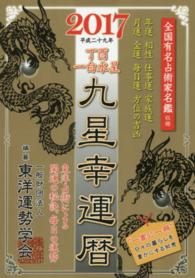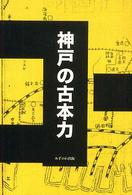- ホーム
- > 洋書
- > ドイツ書
- > Humanities, Arts & Music
- > Linguistics
Full Description
This book argues for the importance of literature studies using the historical debate between the disinterested disciplines ("art for art's sake") and utilitarian or productive disciplines. Forgoing the traditional argument that literature is a unique spiritual resource, as well as the utilitarian thought that literary pedagogy promotes skills that are relevant to a post-industrial economy, Guiney suggests that literary pedagogy must enable mutual access between the classroom and the outside world. It must recognize the need for every human being to become a conscious producer of culture rather than a consumer, through an active process of literary reading and writing. Using the history of French curricular reforms as a case study for his analysis, Guiney provides a contextualized redefinition of literature's social value.
Contents
Introduction Chapter 1. Aristocrats or Anarchists: Who Has Power over LiteChapter 2. The Baccalaureat Exam and the French Canonical Literary ExerciseChapter 3. Inventing and Defending the General Education of Literature Chapter 4. Literature in French Schools after 1968Chapter 5. How (Not) to Teach: "Parroting" vs "Proximity" in Cinematic Representations of Literary PedagogyChapter 6. Harnessing the Neoliberal BeastConclusion








